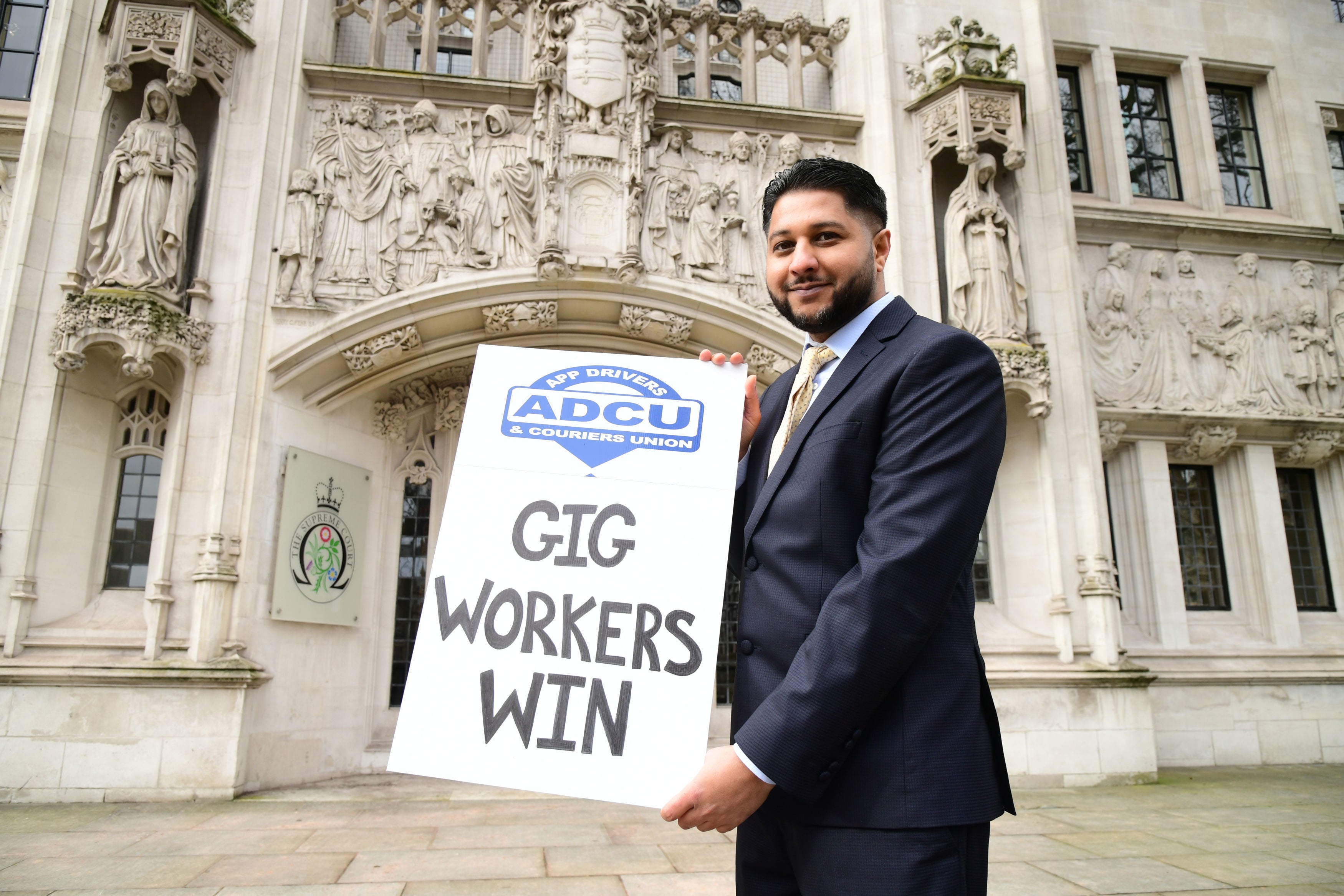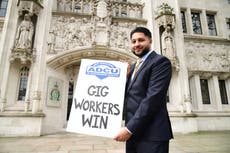A victory for Uber drivers is potentially a win for all gig economy workers
I hope the supreme court’s ruling signifies real change. We need to see job security and protections for every worker in the gig economy


The ruling against Uber yesterday is not just a monumental win for the company’s drivers but it has the potential to secure better rights for everyone in insecure work and the gig economy.
As most businesses have suffered during the pandemic, one area that has thrived is the gig economy. I’m sure many of us have been guilty of getting more takeaways and ordering things online, dropped off by hard-working, masked drivers or brave, shorts-wearing posties. And no matter how grateful we are to the people keeping us connected, fed and well stocked, we have no idea what goes on behind the scenes.
Distribution warehouses filled with agency workers who have few rights and high pick rates were the norm before the pandemic. Amazon warehouses saw high numbers of ambulance call outs – mostly for chest pain, fainting and breathing problems. Pre-pandemic numbers from January 2016 to August 2019 saw 85 call outs were for staff found unconscious or fainting and 51 for staff in Amazon warehouses who had problems breathing. One Amazon worker told me of fights breaking out on the floor as workers try to maintain the high performance rates expected of them.
I would hope that the pandemic had put into perspective the need for the likes of Amazon to truly value their workers’ safety, but videos which emerged late last year showed workers crammed on buses in and out of the warehouses, with no social distancing and an outbreak confirmed at its Scottish offices in Bathgate last month. Behind every statistic is a person.
I will never forget the time I sat down with GMB union reps fighting for their rights as Uber drivers in 2017. They outlined the challenges that thousands of Uber drivers like them faced – they bore all the responsibility of the self-employed but with none of the freedoms. They told me that Uber drivers face up to £30,000 worth of upfront costs when the car, the licences and fees were totalled, and many worked close to full-time hours – some worked over 40 hours a week, battling tiredness to make ends meet and to recoup the upfront costs.
One of the things a person who is truly their own boss can do is choose who they work for and how they work, this was never true for an Uber driver. The app dictated who their customers were, which route they took and even had the performance management style rating at the end of the journey. We always knew that Uber drivers were employees just without the legal rights, sick pay or security of a contract. Claim after claim was upheld but Uber refused to accept that these rights should be afforded to all their drivers. I hope yesterday’s ruling signifies real change. We need to see job security and protections for every worker in the gig economy. And it is possible.
GMB Union took the courier Hermes to court and rather than continually fight, it changed. Hermes recognised trade union membership, it offered workers an option which provided a number of benefits such as holiday pay (pro rata up to 28 days), and individually negotiated pay rates. This should by no means be the end, but it was a start of bringing about some fairness to the very unbalanced gig economy which saw huge profits off the literal backs of the working poor. Far from collapsing, as many bosses in the gig economy like to argue, in March last year, Hermes created a £1m fund for drivers who need to self-isolate.
This week the Labour leader Sir Keir Starmer gave a speech which outlined how we would offer a much-needed alternative to the current woeful government. I thought of large parts of the gig economy when Sir Keir said: “Inequality is not only morally bankrupt, it’s economic stupidity.” And he is right. If we want a prosperous country in which every worker can enjoy security, then we can never go back to business as usual.
Join our commenting forum
Join thought-provoking conversations, follow other Independent readers and see their replies
Comments

Bookmark popover
Removed from bookmarks